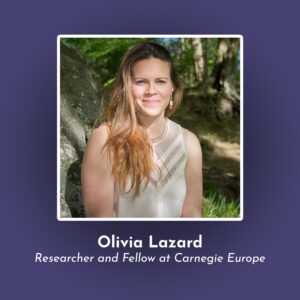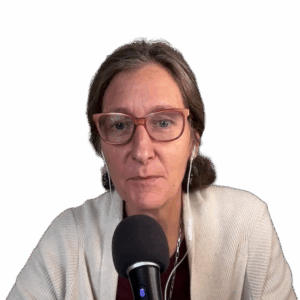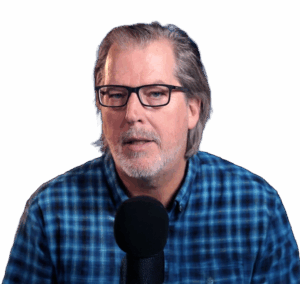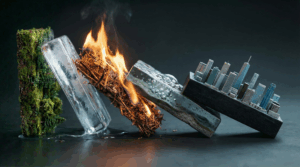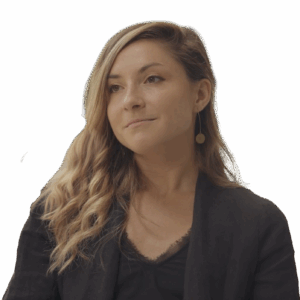
Show Summary
On this episode, environmental peacemaker and mediator Olivia Lazard joins Nate to unpack the relationship between mineral deposits, conflict-vulnerable zones, and high biodiversity areas to create interlocking risks to geopolitical and climate stability. Much like Olivia’s research, this conversation covers a wide variety of topics and is jam-packed with information. Will we have to plunder the planet in order to save it? Will we be able to transition to a multi-polar world order somewhat peacefully? And what can we learn from mediators and peacemakers, like Olivia, as we move into a more materially constrained future – where the whole pie is smaller?
About Olivia Lazard
Olivia is an environmental peacemaking and mediation practitioner as well as a researcher and a fellow at Carnegie Europe. Her research focuses on the geopolitics of climate, the transition ushered by climate change, and the risks of conflict and fragility associated with climate change and environmental collapse. She has over twelve years of experience in the peacemaking sector at field and policy levels. In her fieldwork, her focus was to understand how globalization and the international political economy shaped patterns of violence and vulnerability patterns as well as formed new types of conflict systems that our international governance architecture has difficulty tackling with agility.
In French, we have a motto that says that a simple drawing is often better than a long explanation. Jean-Marc Jancovici Carbone 4 President
That’s very understandable because with left atmosphere thinking, one of the problems is that you see everything as a series of problems that must have solutions. Iain McGilchrist Neuroscientist and Philosopher
We can’t have hundreds and hundreds of real relationships that are healthy because that requires time and effort and full attention and awareness of being in real relationship and conversation with the other human. Nate Hagens Director of ISEOF
This is the crux of the whole problem. Individual parts of nature are more valuable than the biocomplexity of nature. Thomas Crowther Founder Restor
Show Notes & Links to Learn More
Download transcript00:40 – Olivia Lazard work + info
06:26 – Wagner Troops and locations
06:49 – Gold and Diamond deposits, Rare Earth Deposits
07:03 – What are Rare Earths and why are they needed to decarbonize
08:06 – Link between conflict and fragile zones
09:35 – Regenerative Peacebuilding
12:24 – Conflict drivers
13:24 – Conflict resolution in the wake of WWII and the Cold War: Economic Interdependence
19:35 – Olivia’s TED Talk
20:15 – Positive Peace/Negative Peace
22:25 – Ukraine is the most resource rich country in the European region
22:53 – Strategic partnerships between the EU and Canada, and the EU and Ukraine
23:55 – Russian strategic partnerships to gain raw materials
27:20 – US, Saudi Arabia, and Russia leading oil producers
27:30 – Leading oil producers are also leading oil consumers
29:30 – Russia’s denial of need for climate action – actually has a strong understanding of risk
31:32 – History of demonization of the west (Iranian Revolution), reemerging in Russia
33:25 – Putin’s February 21st 2022 address
33:30 – The US has broken international law
36:55 – Illegal activities being included in GDP measures
39:01 – Vandana Shiva + TGS Episode
41:17 – China’s shifting of the international economic system
43:25 – High natural gas prices, Nord Stream pipeline – effects in Europe vs in the global south
44:55 – African Civil Society movement against fossil fuel development, COP 26
45:32 – Tzeporah Berman – fossil fuel non-proliferation treaty
45:51 – Don’t Gas Africa + The Fossil Fuelled Fallacy
49:10 – Dependence of much of the global south for food imports despite having arable land
49:39 – Effects of debt restructuring on the 1970s and 1980s on the global south
52:15 – Simon Michaux + TGS Episode Part 1 and Part 2
53:21 – An electric car uses 6x more materials than a conventional one
53:31 – The electrification of the grid will require 9x more materials than the fossil grid
53:40 – Huge increases in demand for some minerals, especially those needed for batteries
54:20 – Environmental impacts of mining – water, air, soil, biodiversity, integrity of the land, communities
55:43 – Concentration of ore and deposits and overlap between high-risk conflict zones and high-biodiversity zones
1:02:30 – Access to all of this energy would not solve our planetary issues
1:02:55 – Johan Rockström, Stockholm Resilience Centre – Planetary Boundaries
1:04:38 – Randy Hayes, Rainforest Action Network
1:05:02 – Degrowth, Post-growth
1:08:25 – Average planetary consumption of different countries
1:11:09 – Jason Hickel
1:13:43 – European Green Deal and lack of foreign policy components
1:13:52 – Carbon Border Adjustment Mechanism
1:17:40 – ChatGPT doesn’t allow for positive talk about fossil fuels
1:18:19 – Braiding Sweetgrass
1:18:55 – English is largely made up of nouns, versus other languages made up more of verbs

